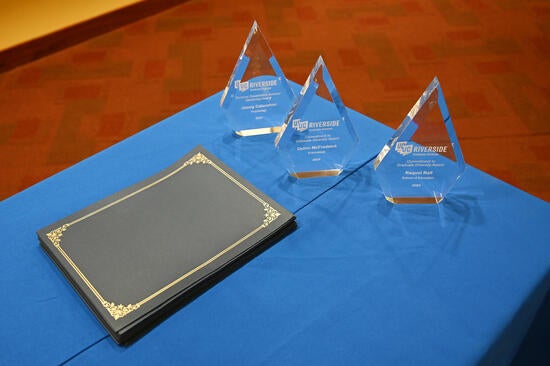
On April 5, the UCR Graduate Division presented awards to several students, postdoctoral fellows, and faculty for their outstanding contributions to UCR’s research and teaching mission.
Grad awards
Taryn Dunivant, a doctoral student in plant biology, received the Yvonne Danielsen Endowed Graduate Award. Her thesis investigates the world of parasites, specifically the arms race between a nematode and its plant host. A first-generation college student, Dunivant attended community college after several years of being in the work force. She has successfully mentored students with similar non-traditional backgrounds and received awards for her outreach and engagement.
Other graduate students who received this award are Shabnam Etemadi and Ann Song.
Three students received Dissertation Year Fellowships that provide support for three quarters to outstanding students to help them focus on their dissertation work and complete their doctoral degrees in a timely manner. Each student receives a research allowance and travel grant. The awardees are Michaela Leung, Joseph Paul Bernardoni, and Ramona Martinez.
Leung is a fourth-year graduate student in Earth and planetary sciences. She is a dedicated teacher and mentor, and has worked to promote women in STEM, including lending support to the Women+ of Color Project. She has worked extensively with NASA, including as executive secretary on a NASA review panel, and is currently a NASA ExoExplorer – one of only 12 in the nation that NASA has selected to receive mentorship from experts in the fields of exoplanet science and engineering. Her research uses the knowledge of gases to look for indications of biological gas production on planets outside our solar system.
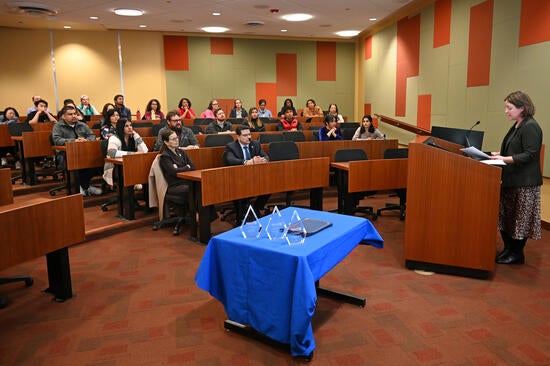
Bernardoni specializes in the philosophy of ethics. His dissertation, “Unwrapping the Present: The Nature, Value and Social Function of Personal Gifts,” explores the concepts of human connection through gift giving. He contrasts the wide-ranging encounters we have with gift opportunities including ritual and ceremonial, charitable, market exchange, and personal gift giving. His thesis is that the personal gift demonstrates care and not just ethical respect. He has mentored students in the summer research program.
Martinez’s research focuses on the positive health benefits of social connection. She points to evidence that social connections are important for our physical health, with lonely or socially isolated people being more susceptible to disease. Besides being an outstanding researcher, Martinez mentors students not normally represented in academia. She received the Jenessa Shapiro Graduate Research Award from the Society of Personality and Social Psychology. She has authored two book chapters.
Thelma Patnett, Aral Greene, and Iliana Cuellar are winners of the UC President’s Pre-Professoriate Fellowship Awards. The awards aim to enhance faculty pathways for historically underrepresented groups. They provide a year of stipend and tuition and a $10 000 professional development grant to be used within the remainder of the student’s doctoral education.
Patnett is in her sixth year in the Anthropology Program. Her dissertation, “Survival and Subversive Care: Ethnographic Narratives of Nicaraguan Women and Queer Exiles in Costa Rica and the US,” addresses the survival strategies that have evolved because of empire and war on the dispossessed populations of Nicaraguan women and queer refugees in San Jose, Costa Rica, and the U.S. A first-generation student, Patnett has established a mental health support pipeline for student-parents. She also serves as the founding member and organizer of UCR’s first Mesoamerica Working group to bring attention to critical issues affecting the Central American population.
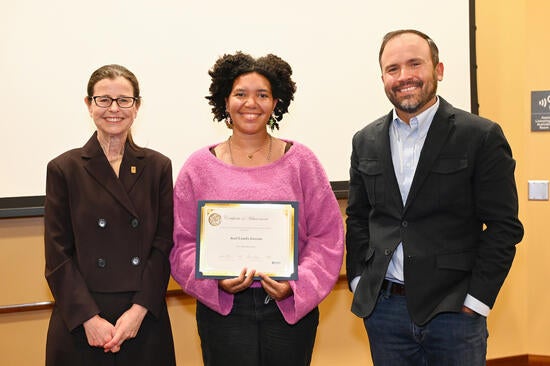
Greene is in the fourth year of her doctoral studies in environmental sciences. She investigates the loss of nitrogen in arid environments. She is determining how and where nitrogen loss takes place and measuring nitrogen compounds in the watershed and atmosphere. Her preliminary data suggests that nitrogen is lost primarily to the atmosphere in arid zones. She received an honorable mention from the National Science Foundation. She is a recipient of the campus-wide Outstanding Teaching Award. She believes her research can bring land managers, urban scientists, and social scientists together to work on problems that disproportionally impact marginalized communities.
Cuellar is a first-generation Salvadoran Latinx student in her sixth year of the Comparative Literature Program. Her thesis is titled “Palimsexts and Body Doubles: Autotheory in the films of Agnes Varda, Albertina Carri, Laeitita Masson and Lina Rodriguez.” Her work points out the lack of recognition of female filmmakers in popular culture and asks about the filmmakers’ perception of self. Her work analyzes multiple feminist performances that look inward and counter the classical male perception of women in literature and film. Her research has received support from the UCR Center for Ideas and Society and a National Humanities Center grant.
Postdoc awards
The Graduate Division also gave out 2024 Excellence in Postdoctoral Research awards. The recipients are Inaiara de Souza Pacheco, Giulia Scarparo, and Feng Tang.
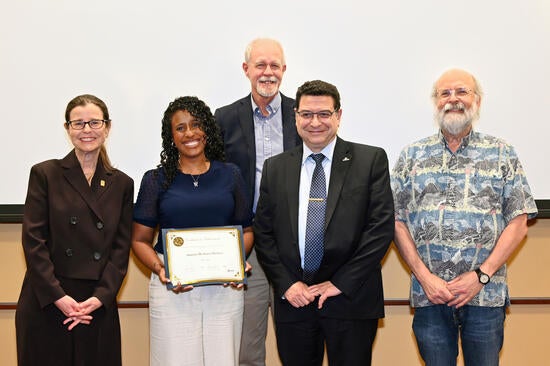
de Souza Pacheco grew up in an area of Brazil where most children do not finish high school. She is now a postdoctoral scholar in entomology. Her research focus is to generate mutants of the glassy-winged sharpshooter — a major invasive and agricultural pest that transmits bacterial pathogens. Her broader long term research goals are to help develop more sustainable agriculture. She has successfully generated two mutated sharpshooter gene lines. She plans to modify the sharpshooter so that it cannot transmit bacterial pathogens responsible for crop damage. She is the recipient of several scholarships and has been invited to present her work at national and international meetings.
Scarparo is also a postdoctoral scholar in entomology. Her research examines the genes responsible for host parasite interactions in Formica ants. Her hypothesis is that supergenes involved in parasitism drove the socialization of insects we see today. She has presented her work at multiple venues and has helped organize several conferences and symposia. She teaches and mentors students under the U.S. Department of Agriculture grant “Six Legs, Endless Possibilities: Training the Next Generation of Agricultural Scientists.”
Tang is a fourth-year postdoctoral researcher in chemistry. His general area of research is investigating mechanisms of DNA damage induced by environmental exposure and cancer. He has developed methods to map oxidation-induced lesions in DNA on a genome-wide scale and at a single-nucleotide resolution. He is the recipient of a highly prestigious National Institutes of Health K99 award, putting him on the path to an independent career.
Faculty awards
Raquel Rall, an associate professor and associate dean of strategic initiatives in the School of Education, and Quinn McFrederick, a professor of entomology, each received the 2023/2024 Commitment to Graduate Diversity Award.
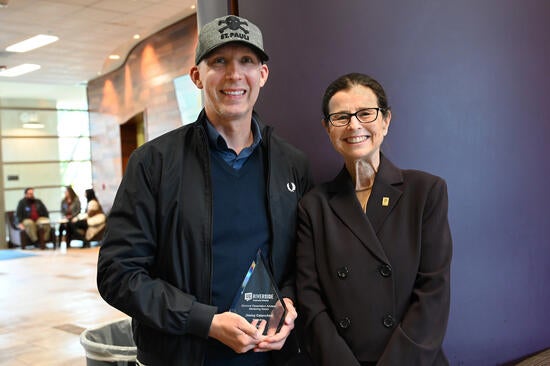
Rall’s research focuses on leadership, access, and equity in higher education. She is the recipient of multiple awards including the 2021-22 School of Education’s Faculty Mentoring Award. The UCR African Student Program awarded her “Faculty Member of the year” in 2020. She serves on the Systemwide UC Black Administrator’s Council and is a member of the Black Community Council at Stanford University.
McFrederick’s research focuses on symbiotic relationships that involve insects. He investigates the microbiome of bees, parasites of bees, microbes that help protect bees, and how all of these vary with the type of bee. McFrederick joined UCR in 2014 and has mentored two postdoctoral scholars, eight graduate students and 18 undergraduates. He has also served on the Department of Entomology’s outreach committee, which visits more than 30 schools a year and helps organize the Riverside Insect Fair.
Jimmy Calanchini is the Academic Senate 2023/24 awardee of the Doctoral Dissertation Advisor/Mentor award.
A professor of psychology, Calanchini joined UCR in 2018. He studies attitudes to behavior, including on a regional scale, the influence of bias in memory and the processes that underlie implicit bias. He uses mathematical modeling, which, he proposes, can link the fields of cognitive and social psychology. He has a deep commitment to mentorship and passion for encouraging and supporting diversity within his own lab and the Department of Psychology. In 2021 he was awarded the Graduate Division “Commitment to Graduate Diversity Award.”